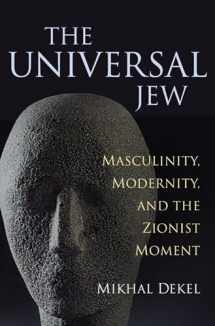
The Universal Jew: Masculinity, Modernity, and the Zionist Moment
ISBN-13:
9780810127173
ISBN-10:
0810127172
Edition:
1
Author:
Mikhal Dekel
Publication date:
2011
Publisher:
Northwestern University Press
Format:
Paperback
304 pages
FREE US shipping
Book details
ISBN-13:
9780810127173
ISBN-10:
0810127172
Edition:
1
Author:
Mikhal Dekel
Publication date:
2011
Publisher:
Northwestern University Press
Format:
Paperback
304 pages
Summary
The Universal Jew: Masculinity, Modernity, and the Zionist Moment (ISBN-13: 9780810127173 and ISBN-10: 0810127172), written by authors
Mikhal Dekel, was published by Northwestern University Press in 2011.
With an overall rating of 4.1 stars, it's a notable title among other
books. You can easily purchase or rent The Universal Jew: Masculinity, Modernity, and the Zionist Moment (Paperback) from BooksRun,
along with many other new and used
books
and textbooks.
And, if you're looking to sell your copy, our current buyback offer is $0.45.
Description
The Universal Jew analyzes literary images of the Jewish nation and the Jewish national subject at Zionism’s formative moment. In a series of original readings of late nineteenth-century texts—from George Eliot’s Daniel Deronda to Theodor Herzl’s Altneuland to the bildungsromane of Russian Hebrew and Yiddish writers—Mikhal Dekel demonstrates the aesthetic and political function of literary works in the making of early Zionist consciousness. More than half a century before the foundation of the State of Israel and prior to the establishment of the Zionist political movement, Zionism emerges as an imaginary concept in literary texts that create, facilitate, and naturalize the transition from Jewish-minority to Jewish-majority culture. The transition occurs, Dekel argues, mainly through the invention of male literary characters and narrators who come to represent "exemplary" persons or "man in general" for the emergent, still unformed national community. Such prototypical characters transform the symbol of the Jew from a racially or religiously defined minority subject to a "post-Jewish," particularuniversal, and fundamentally liberal majority subject. The Universal Jew situates the "Zionist moment" horizontally, within the various intellectual currents that make up the turn of the twentieth century: the discourse on modernity, the crisis in liberalism, Nietzsche’s critique of the Enlightenment, psychoanalysis, early feminism, and fin de siècle interrogation of sexual identities. The book examines the symbolic roles that Jews are assigned within these discourses and traces the ways in which Jewish literary citizens are shaped, both out of and in response to them. Beginning with an analysis of George Eliot’s construction of the character Deronda and its reception in Zionist circles, the Universal Jew ends with the self-fashioning of male citizens in fin de siècle and post-statehood Hebrew works, through the aesthetics oftragedy. Throughout her readings, Dekel analyzes the political meaning of these nascent images of citizens, uncovering in particular the gendered arrangements out of which they are born.


We would LOVE it if you could help us and other readers by reviewing the book
Book review

Congratulations! We have received your book review.
{user}
{createdAt}
by {truncated_author}


